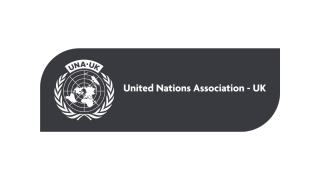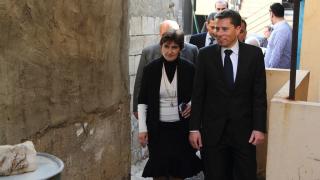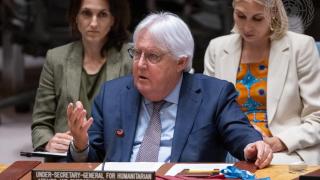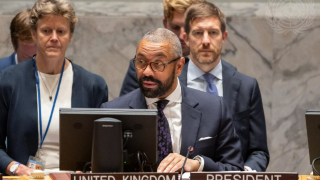
UNA-UK calls on the UK and its allies to use all tools available to halt the humanitarian catastrophe unfolding in Gaza.
More than two weeks of devastating violence has resulted in civilian casualties of an unconscionable scale - we echo the message from the UN Secretary-General: nothing can justify the atrocities carried out by Hamas on 7 October, and nothing can justify Israel’s collective punishment of Palestinian civilians.
We urge the UK and its allies to recognise the catastrophe unfolding and implore them to pursue every route available to secure an immediate humanitarian ceasefire. As the dire situation worsens, we demand member states heed the call from the UN Secretary-General and implore all parties to uphold and respect international humanitarian law, to take care to spare civilians when conducting military operations, and to respect and protect hospitals and the inviolability of UN facilities.
UNA-UK unequivocally condemns the heinous attack carried out by Hamas in Southern Israel in which 1,400 Israelis were killed and over 200 people taken hostage, atrocities that constitute a war crime. It cannot be disputed that Israel has a right to defend itself, nevertheless war must be fought according to international humanitarian law. We are equally unequivocal therefore, that these horrific acts cannot justify Israel’s disproportionate and indiscriminate response against Palestinians which, according to UN experts, is resulting in crimes against humanity. More than 6,500 civilians in Gaza have been killed since Israel launched its response.
The International Criminal Court (ICC) has a mandate to investigate any and all alleged atrocities committed by different parties, starting with the instigating atrocities of Hamas. We urge the UK to make this clear in their public statements, and call on them to reaffirm the role and jurisdiction of the ICC Prosecutor to pursue justice and accountability for these crimes.
Today, the international community’s priority must be the preservation of human life above all else. According to the UN Relief Works Agency (UNRWA) - currently the largest humanitarian provider in Gaza - “an unprecedented catastrophe is unfolding before our eyes”.
Israel’s aerial bombardments of the Gaza Strip have razed large areas to the ground and have resulted in 1.4 million Gazans being internally displaced. In tandem Israel has tightened the 16 year siege to the enclave by cutting off access to water, electricity, medicine, fuel and other basic needs. The UN High Commissioner for Human Rights highlighted that the imposition of sieges that endanger civilian lives are prohibited under international humanitarian law (IHL), and UN experts have raised serious concerns that forcible population transfers are a violation of IHL and criminal law.
While UNA-UK welcomes the recent breakthroughs that have allowed for aid convoys to pass through the Rafah crossing to deliver essential food, water and medicine, this delivery is equivalent to roughly four percent of the daily average that entered Gaza prior to hostilities. It is clear this does not meet the scale of humanitarian needs that are worsening by the day. Critically, these convoys have not brought in fuel to Gaza and it has been reported that UNRWA is expected to imminently exhaust its remaining fuel reserves - without which aid operations, clean drinking water and hospitals will be shut off.
The UK and its allies must leverage their influence to preserve humanity, respond to the humanitarian crisis unfolding and ensure that all parties comply with the laws of war. We were dismayed by the United States’ decision last week to veto a UN Security Council resolution that would have condemned Hamas, enabled urgently needed action to ensure vital humanitarian aid and essential services reach people, issued a call for all parties to abide by international humanitarian law, and demanded the release of hostages. While the UK chose to abstain, we commend Brazil’s efforts in leading on this text that secured 12 Council members votes in favour.
Inevitably that decision has led to further back and forth in the Security Council, while the task of passing a resolution has moved over to the UN General Assembly. The tenth Emergency Special Session on the “Question of Palestine” will convene on Thursday 26 October, following a request to the President of the General Assembly from the Chairs of the Arab Group and the Organisation for Islamic Cooperation.
Civilians in Gaza cannot wait. An immediate ceasefire must urgently be secured and all parties must unconditionally:
- Facilitate the delivery of lifesaving assistance, including food, medical supplies, fuel, and the resumption of electricity and internet to Gaza, in addition to safe passage of humanitarian and medical staff
- Free all civilian hostages, especially children and those with underlying health conditions
- Allow humanitarian convoys to reach UN facilities, schools, hospitals, and health facilities in northern Gaza and commit to protecting them along with the civilians and staff inside them at all times
- Rescind orders by the Government of Israel for civilians to depart northern Gaza
- Allow patients in critical condition to be medically evacuated for urgent care
All states have a responsibility to protect civilians. UNA-UK believes the UK has a special responsibility - as a permanent member of the UN Security Council, former colonial power in the region, and the world’s second-largest arms exporter - including at least half a billion in export licences to Israel over the past decade. It is thought that around 15% of the value of each of Israel’s F-35 combat aircraft is produced in the UK. The aircraft are being heavily used in Israel’s bombing campaign on Gaza.
UNA-UK is deeply concerned that earlier statements, from both the UK government and members of the opposition, of unconditional support for Israel have provided a carte blanche for the disproportionate devastation and destruction of Gaza. Israel's own experience of counterterrorism campaigns of recent decades tells us that such retaliation, far from making Israel safer, will only perpetuate a cycle which will lead to the death of more Israelis, as well as Palestinians, and ultimately only benefits the arms industry.
Last year UNA-UK commended the UK for joining 82 states in endorsing a political declaration committing to action to avoid civilian harm from the use of explosive weapons in populated areas - the leading cause of civilian casualties in armed conflict. Endorsing states have committed to take action by making changes to their national policy and practice and promoting stronger standards. The UK should live up to this declaration by calling for an immediate cessation of bombing in what is one of the most heavily populated territories on earth. A failure to do so suggests the absence of a joined up and consistent foreign policy. It diminishes the project to protect civilians by failing to put a well-established principle into practice. Palestine has signed the declaration but Israel has not.
This ongoing cycle of violence need not be inevitable, and we urge the UK and its allies to pursue diplomatic routes to stem the tide of violence and recognise that escalating militarism risks intensifying unacceptable human suffering and is a recipe for catastrophic wider conflict in the region.
We urge the UK to immediately:
- Take action to save lives and secure a humanitarian ceasefire
- Unequivocally call for all parties to abide by international humanitarian and human rights law
- Work across regional groups in the General Assembly for action focused statements to prevent further atrocities
- Vocally champion COI and ICC investigations, calling for unhindered access for investigators in all instances
- Answer the appeals for funding from UNRWA
- Suspend arms export licences to Israel relevant to current hostilities
This statement reflects the position of UNA-UK staff.






